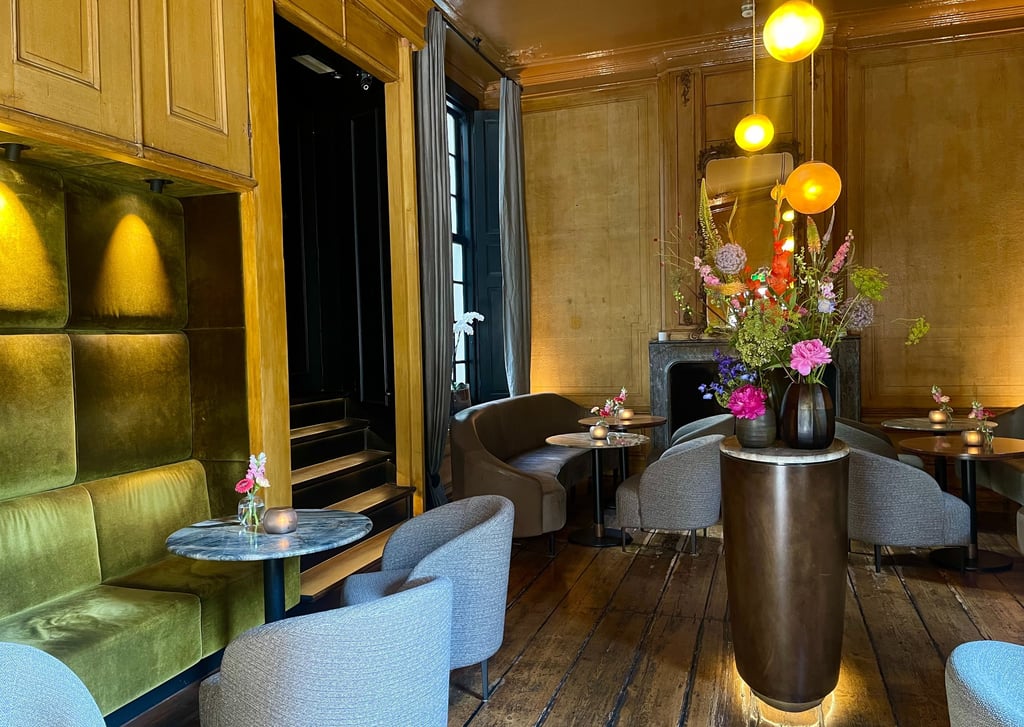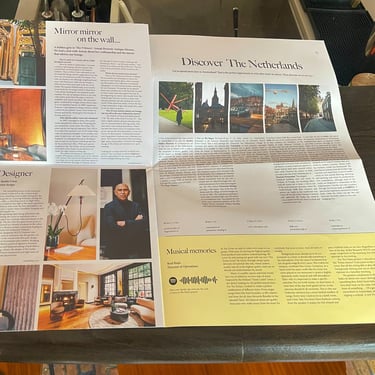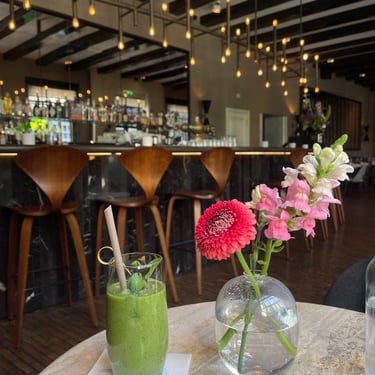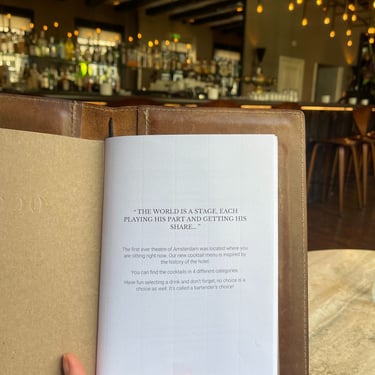Tuning Into Emotion: How Music Shapes Brand Experience in Hospitality
This article explores the strategic role of music in creating emotionally resonant guest experiences. Drawing on insights from neuroscientist Walter J. Freeman, music cognition expert David Huron, and from the podcast Hospitality Daily, this article shows how music can align brand identity, influence perception, and build lasting emotional connections. Featuring a visit to The Dylan Amsterdam, it illustrates how intentional sound design becomes a powerful asset in modern hospitality.
HOSPITALITYGUEST EXPERIENCEEXPERIENTIAL MARKETING
Lamya Valter Schmidlin
6/21/20254 min read


Music is defined as “a pattern of sounds made by musical instruments, voices, or computers, or a combination of these, intended to give pleasure to people listening to it” by the Cambridge Dictionary. What does music mean in a hospitality context? Music is the first beat we feel, one of the subtle reasons we remember a moment, the rhythm that connects strangers at the bar. It serves as a powerful emotional cue, offering hospitality professionals a unique tool to enhance the guest experience. This article explores why music matters in hospitality and how it can be used strategically to create a harmonious, emotionally resonant brand experience.
1. A Bonding Tool for Community Branding
Hospitality is uniquely positioned to leverage the need for human connection. It is rooted in shared experience and social interaction. This is why some lifestyle brands extend into hospitality: hotels and spaces become live expressions of their brand DNA. When creating the guest journey of a hotel or restaurant, defining the touchpoints usually include selecting tangible materials, design, or iconic colors. Music, however, is not always the most regarded. A well-curated playlist enables a brand to engage guests emotionally, encouraging a sense of community.
As neuroscientist Walter J. Freeman explains in A Neurobiological Role of Music in Social Bonding : “Each mind constructs its world view… Music is one of the few technologies that allows us to cross that solipsistic gulf.” Solipsism* refers to the belief that only your own experiences and existence are real or important. In this light, music can be positioned as a bridge, crossing that “solipsistic gulf”, to create moments of shared experience among individuals from different cultures and backgrounds.
*Cambridge Dictionary
For hospitality brands, this opens the door to emotional alignment and brand DNA harmony. Whether through upbeat rhythms, Latin energy, or rock anthems, music can reflect brand values and help build connections between guests across continents, who are not united by demographics but by shared aspiration (or valuegraphic - David Allison).
2. The Risk of Mismatch: Music and Brand Expectation
Guests subconsciously expect the environment to match their internal image of the brand. Just as the right music enhances connection, the wrong music can disrupt it. Since the first step into the hotel, in the lobby. A disconnect between a brand’s identity and its musical environment can lead to emotional dissonance, an uncomfortable friction between what guests expect and what they experience. This is mentioned in the podcast Hospitality Daily**, where Dr. Michelle and Clay Bassford discussed David Huron’s theory of expectancy. Guests subconsciously develop expectations based on a brand's positioning. If those expectations are contradicted, the result can be confusion or discomfort.
David Huron and Elizabeth Hellmuth Margulis’ prediction effect in Musical Expectancy and Thrills explains: “Listeners prefer familiar stimuli not because they are familiar, but because they are predictable.”
In this context, in hospitality, predictable means contextually appropriate. The music must align with the atmosphere and emotional cues expected by the guest. A spa might aim for calm, immersive soundscapes such as low-tempo ambient or instrumental music rather than pop tracks, which may create cognitive dissonance and interrupt the relaxation process. In the podcast, Dr.Michelle, illustrate this friction with AfroSwing music in an Italian restaurant which did not match the environment and the vibe.
**https://podcast.hospitalitydaily.com/sound-design/
3. Music Creates Memory in Space
Music fuses with space, action, and emotion to build memory. In a hotel setting, each area such as the lobby, the bar, the restaurant, or the spa, has its own role in the guest journey. Music helps tie emotions to these specific places.
Walter J. Freeman’s work on Gestalts and multisensory perception highlights: “Musical sounds, and the somatosensory and visual contexts in which they are perceived, converge... These integrated patterns are the basis for awareness.” Applied to hospitality, this can be translated as:
Music blends with spatial context (where the guest is)
Movement (what the guest is doing)
Social cues (who the guest is with)
This multisensory blend helps creating memories emotionally anchored to a place. Having this is in mind, there is a great opportunity to develop brand experiences across countries for multihotel portfolio brands which foster guest loyalty. Imagine a guest enjoying a sophisticated cocktail while listening to a pleasant joyful music with new friends. A few month later, while in a different city, the guest has chosen to stay in the same hotel brand. Music is on in the bar, the same melody plays and instantly, the emotional memory returns.
The Dylan, Amsterdam - captured by Lamya Valter Schmidlin - Story of the visit below



The emotional journey in hospitality starts before service, with sensory signals. Neuroscience shows that dopamine is linked to anticipation, not the reward itself. When it aligns with brand cues, it supports a coherent narrative and strengthens emotional engagement. If it clashes, it causes confusion and damages the experience before a guest even checks in. It is a branding tool, a community enabler, and a memory builder. When done with intention, it becomes a strategic asset for any brand looking to deepen guest engagement and emotional connection.
References I´ve read (or listened to) for this article:
Freeman, W. J. (2000). A neurobiological role of music in social bonding. Journal of Consciousness Studies, 7(6–7), 62–77.
Allison, D. (2012). The Valuegraphic Model: A new tool for understanding consumer behavior. Retrieved from https://www.valuegraphics.com
Huron, D., & Margulis, E. H. (2010). Musical expectancy and thrills. Psychology of Music, 38(4), 545–564. https://doi.org/10.1177/0305735610370834
Bassford, C., & Michelle, D. (Hosts). (2023, June 18). Sound design in hospitality [Audio podcast episode]. Hospitality Daily. Retrieved from https://podcast.hospitalitydaily.com/sound-design/
Freeman, W. J. (2009). Gestalts and multisensory perception: A neuroscience perspective on memory and awareness. Neuropsychology, Development, and Cognition, 18(2), 232–245.
For more insights and talk about this topic, feel free to contact me at lamya@lvsacrosscultures.com or connect with me on LinkedIn here!
Lamya Valter Schmidlin
--
The visit - Hotel The Dylan Amsterdam
Lucky enough to be currently living in Amsterdam, each Saturday is a new opportunity to discover its hospitality treasures. This week was dedicated to The Dylan, a 5* boutique hotel full of charm. While sipping my smoothie on the first day of summer, all the ingredients were gathered to make me feel pampered in a refined, historic yet modern environment. Wood, flowers, a well curated menu that reflects the heritage, and pleasant notes playing. Curious about a song I shazamed it and finally went to ask the gentleman at the bar if it was a bespoke playlist. He smiled. I wasn't expecting him to hand me something like a newspaper, sort of the Dylan Gazette. On one page, there was an insert called "Musical memories", with a message from the Director of Operations about the importance of music selection in this hotel, which was seeking to "tickle every sense of our guests". The Spotify code was available for every guest to scan, allowing them to take The Dylan notes home.
--
LVS *AC
Cross-cultural guest experience research
contact
lamya@lvsacrosscultures.com
© 2026. LVS AC - All rights reserved.
